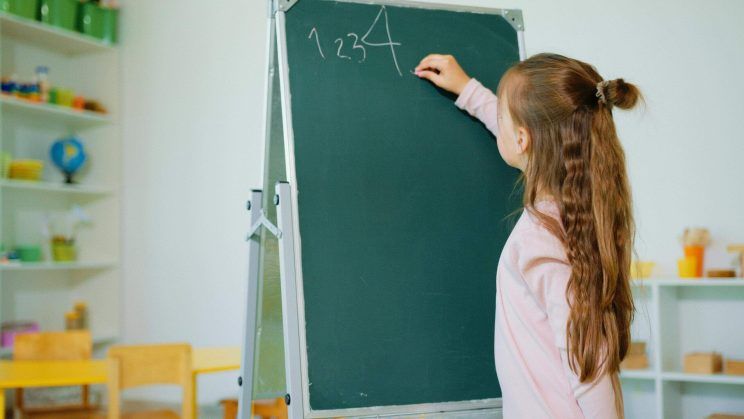How To Help Your Kids With Math: 10 Proven Ways
reviewed by Camille Ira B. Mendoza
Updated on June 21, 2024
Is homework time turning into a battleground of multiplication tables? You’re not alone. Many parents struggle in those situations, feeling flashbacks to their own school struggles. That’s why we are here to help you. Read this article to discover 10 unique ways to help kids learn math.
How to help my child with math at home
To help your kid with math at home, you should implement fun activities and everyday moments. It can help make math easier for your child. Bake cookies to practice fractions or talk about shapes while sorting laundry. Keep it positive; short bursts of practice are among the best strategies for helping kids learn math.
How parents can help with math at home
Parents and teachers can help a child with math by focusing on accomplishments and celebrating their efforts. Math anxiety is real, and it can affect your child’s motivation. Brighterly tutors can teach your kid math and improve their self-esteem.
10 proven ways to help kids with math at home
- Find daily application
- Talk about math at home
- Practice it with your kid
- Adopt a positive attitude
- Use pictures and flashcards
- Get them moving
- Gamify the experience
- Make math a competition
- Ask the kid to teach you
- Get a Professional tutor
When your kid is struggling with STEM class, the only question in parent’s mind is, “How to help my child with math at home?”. That’s why we’ve gathered 10 tactics to benefit kids’ academic achievements. Implement them into your daily routine to see the first results in the foreseeable future.
Find daily application
Implement simple math into each daily task. Just don’t let your kid damage any property 😁
If you want to help your kid with math, incorporate math equations into daily situations. That way, you can demonstrate the importance of this subject to them. You can ask them to pre-calculate some bills, do grocery shopping, and do other parts of your daily routine.
If your kid is naturally interested in working in the same field as you, show them how you use math in your job. Thus, they will see the actual importance of this discipline.
Talk about math around the house
Sometimes it’s enough just to communicate the logic behind the processes
Talking about math around the house isn’t about turning everyday moments into a math class. Instead, it’s about subtly weaving math concepts into your conversations to show your child how relevant and useful math is in the real world. That’s how you can help your kids with math without boring moralizing stuff.
As discussed previously, making math real can significantly impact children’s understanding and confidence in the subject. By pointing out math in everyday situations, you show your child that math is a tool they can use to solve problems and make sense of the world around them.
While discussing concepts, you naturally introduce and reinforce vocabulary terms like “bigger,” “smaller,” “half,” “double,” “faster,” or “slower.” This will build a foundation for future formal math learning.
Practice it with your kid
Sometimes, we all feel like this raccoon while doing math, and it’s OK
Even adults sometimes need a parental figure (e.g., a more experienced older colleague or team lead) to help them complete complicated tasks. Sometimes, the best way to help your child with math is to simply sit in the same room with them and provide help when they ask you about it.
To encourage independence, create a routine where you help kids with math for 10-15 minutes each evening and let them finish the task discussed by themselves. That way, you foster their independence while being present in the kid’s life.
Adopt the positive attitude
As Miley Cyrus once said, “Everybody makes mistakes.” Don’t let them ruin your day
When math is a struggle, how can you help your child improve? Sometimes it’s enough to endorse them in this journey. While a child may have a negative attitude toward math due to its abstractness, you can change it.
According to a 2017 study in School Science and Mathematics, parents’ attitudes toward STEM disciplines significantly predict students’ attitudes toward mathematics. When you help your child with math that way, they feel a genuine connection with you.
Use pictures and flashcards
Leave visual hints to the kid
An appropriate illustration is a great tool to help with math and visualize abstract concepts. For instance, you can display the logic behind fractions (visualizing a pie cut into slices) or geometry (shapes in the real world).
Pictures can connect math to real-life experiences. Flashcards with clear visuals and numbers can help kids memorize basic facts and formulas, like addition and multiplication tables.
Using flashcards encourages active recall, where children have to retrieve information from their memory, strengthening those connections. You can turn the flashcard usage into an offline interactive game, making practicing math more enjoyable.
Get them moving
Ask the kid to count their jumps or steps while running. However, safety first!
Some kids are kinesthetic learners, so they need some kind of movement to solidify their knowledge. Use skipping rope and try jumping to teach the kid addictions and multipllications. Ask them to count the steps on the stairs and let them jump.
These are just some basic examples. You can create your own exercises based on your needs. That way, you are helping your kid with math and releasing their excessive energy in a friendly manner.
Gamify the experience
Make math entertaining
Even adults like games. Thus, gamification of the studying process is a beautiful idea on how to help a child struggling with math. It can help them solidify knowledge in a friendly manner.
There are many online gamified learning platforms for your kid. Colorful animation and interactive content can speed up learning. You can gamify even offline experiences by motivating to complete complex equations. For instance, if kids complete some important extra task at school, they can visit the local amusement park.
Make math a competition
Let your kid win in this competition. Don’t let them become a new James Bond
Recall how your kids engage in a gamified competitive environment, like playing Alias or Monopoly. Use the same attitude while you help your kid with math.
Develop some sort of competition (but a friendly one), and let your kid win. That way, you can practice with your child and develop a positive attitude toward STEM subjects.
Ask the kid to teach you
Switch the roles. It helps you to relax while solidifying kids’ knowledge
Yes, you heard it right. Let the kid teach you math. It can benefit their learning. It’s a non-obvious way of helping your child with math that works due to the reinforcement process.
When your child explains a concept to you, they force themselves to solidify their understanding. Putting knowledge into words strengthens the neural pathways in their brain.
Taking on the role of the teacher can boost your child’s confidence. Seeing you listen and learn from them validates their knowledge.
Teaching often requires breaking down concepts into simpler terms. This process can help your child feel more confident about math. It’s okay if their explanation isn’t perfect. The goal is for them to communicate their understanding.
Get a professional tutor
Ask the tutor’s help to ease the studying process
Some parents may need to remember how to solve complex equations or be unfamiliar with modern teaching methods. And that’s OK. Professional tutors help your child understand the logic behind math, not simply memorize formulas.
Considering all circumstances, they can find the best approach to helping your kid with math. By providing a deeper math understanding, your kid boosts their logical thinking, which benefits them in the long run. Personalized learning plans can cover kids’ knowledge gaps so they can master new complex material more efficiently.
How Brighterly can help kids get better at math
We want to help your kid with math by teaching them the logic behind each action. Learning formulas is crucial. However, a clear understanding of actions while calculating is even more important. Thereby, your kid will feel more confident even with the most complex tasks. Online lessons allow them to focus on learning, as they can study in their familiar surroundings. It can be a cafe, living room, or favorite couch.
We appreciate kids’ comfort. That’s why we provide interactive math activities. That way, they will learn and gain new logical skills, which will be felt as a game with a tutor.
All you need to start helping your kids with math is to book a free demo lesson.

We are also highly focused on area and concept study, so we don’t follow school programs. If you need to close a knowledge gap from the previous year, we will gladly help. If they understand the current school program and want to learn something new before their classmates, we tailor a personalized program to fit their needs.
Conclusion
A personalized approach is the key to achieving the best educational results. We will gladly create a custom educational program that helps your kid with math. Brighterly is an online service, meaning your kid can learn STEM disciplines even from their favorite couch or backyard while jumping and sunbathing.
Are you looking for a math learning website for your child that goes beyond just memorizing formulas? Do you want to find teachers who will equip your kids with math concepts that will help them solve math problems easily in the future?
Try the Brighterly! Our professional tutors understand the importance of developing critical thinking skills in math, and our custom curriculum is designed to help students grasp concepts in their entirety. Give your child the opportunity to excel in math, and register now on Brighterly!














